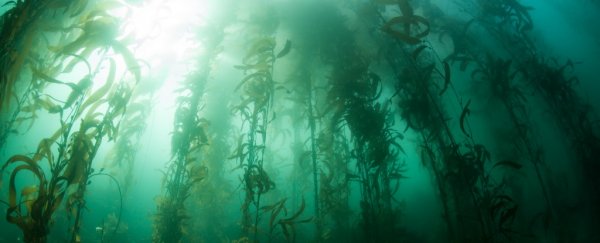We've all been worrying over the state of the Great Barrier Reef, but new research has shown that it's not the only important part of our oceans that's struggling with the effects of climate change.
Kelp forests, which are underwater ecosystems full of large, seaweed-like algae, are under attack, with the arrival of invasive fish species that thrive in warm waters - and the problem only getting worse.
A team at the University of New South Wales (UNSW) in Australia has found that these important underwater forests are not only suffering from rising ocean temperatures - they're being feasted upon as we speak, and they risk taking a whole lot of other species down with them.
"Kelp forests provide vital habitat for hundreds of marine species, including fish, lobster, and abalone," says one of the team, Adriana Vergés of UNSW and the Sydney Institute of Marine Science.
"As a result of climate change, warm-water fish species are shifting their range and invading temperate areas."
Kelp forests might not be as visually impressive as a reef system, but they house hundreds of marine species - and losing them would be just as damaging for marine life.
To figure out how these forests are coping with rising temperatures, the researchers investigated underwater video footage from the NSW north coast in Australia, between 2002 and 2012.
During that time, the water had warmed by 0.6 degrees Celsius.
The video footage showed that, over time, warm-water fish species had moved into cooler waters where the kelp forests grow, and the kelp had declined in those areas as a result.
"We found that two warm-water species - rabbitfish and drummer fish - were the most voracious, eating fronds within hours at an average rate of 300 bites per hour," said Vergés.
Fish species that normally live in these cooler climate kelp forests are also being dominated by these warm-water fish - pushing the original fish communities out.
"Our results show that over-grazing by these fish can have a profound impact, leading to kelp deforestation and barren reefs," said Vergés.
"This is the first study demonstrating that the effects of warming in kelp forests are two-fold: higher temperatures not only have a direct impact on seaweeds, they also have an indirect impact by increasing the appetite of fish consumers, which can devour these seaweeds to the point of completely denuding the ocean floor."
The researchers determined that if increases in water temperature continue, this would pose a massive threat to kelp forests and the health of the oceans in general.
"Our results show that warming-mediated increases in fish herbivory pose a significant threat to kelp-dominated ecosystems," the researchers report.
Losing these kelp forests is not only an environmental issue, but they also support a number of commercial fisheries, tourism, and recreation activities worth over AU$10 billion a year in Australia.
"Increases in the number of plant-eating fish because of warming poses a significant threat to kelp-dependent ecosystems both in Australia and around the globe," says Vergés.
"The decline of kelp in temperate areas could have major economic and management impacts."
Unfortunately, this is just another way that global warming is affecting our sea life, but with new agreements in place, we might still be able to limit the damage to our oceans.
The research has been published in the Proceedings of the National Academy of Sciences.
UNSW Science is a sponsor of ScienceAlert. Find out more about their world-leading research.
